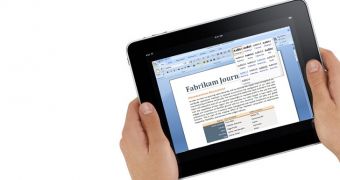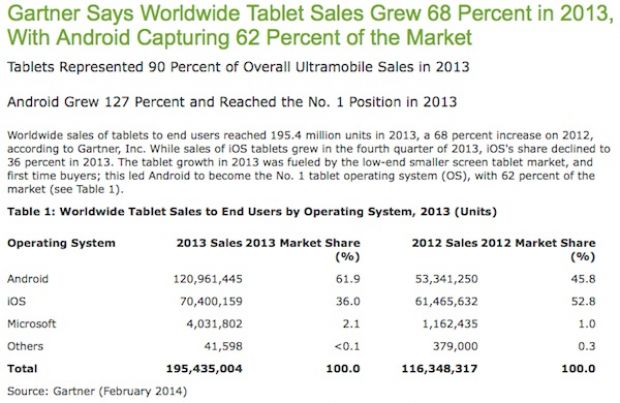Not so long ago Microsoft announced it was finally bringing Microsoft Office to the iPad. The tech giant decided to finally launch its famous Office suite on the iPad, but not on Android tablets.
The move is quite puzzling when you think about it, especially since Android tablets hold the larger market share.
Taking things apart, Apple might be the most respected and popular brand in the tablet ecosystem, but Google is bringing its weight too, only if by virtue of volume. With all efforts combined, Android manages to grab almost 62% of the worldwide tablet market, compared to Apple’s 36%, according to Gartner.
Throughout 2013 Android tablet shipments grew with a mind-blowing 127% which amounts to a total of 121 million tablets shipped worldwide. Comparatively, Apple has only managed to sell 70 million iPads.
Though this is an improvement from the previous year, when the Cupertino tech giant managed to sell only 61.5 million, in terms of marketshare, Apple saw a decrease from 52.8% hold to 36%.
So taking the evidence into account, doesn’t it makes sense Microsoft would want to launch Office on Android tablets, too?
Before you say anything, granted, Microsoft Office is already available for Android smartphones, but having the convenience of working on a larger screen (that rivals laptops) is surely an important point to take into consideration.
Moreover, the Office Android app is pretty restricted in its use, as opposed to the full blown version the iPad got.
Going back to the problem, Microsoft Office is often used in the work environment and even if usually tablets are thought of entertainment devices, the tide has shifted and more and more professionals are turning to slates to fulfil their mobile working needs.
And Office on a business tablet, will certainly add a few productivity points to the product, right off the bat.
Samsung’s latest high-end line of slates is targeted especially at the business crowd, with the tablets offering multi-tasking features and the ability to set up multiple profiles.
Nevertheless, the fact that there’s no Office to be found on board might prove a great liability for the Korean tech giant. As we speak, there’s no productivity app for the Android tablet ecosystem that can match Office and this is a real shame.
However, the majority of Android slates owners is going to put the devices to different uses, including video and media streaming, game playing and the browsing of social media and the likes. Some of them might hand them out to kids or grandparents.
Furthermore, most Android users aren’t really used to paying serious amounts of money for downloading software, because a large chunk of Google Play apps come for free.
On the other hand Apple owners customary pay for their apps and there’s a also a large amount of them using the tablets for work-related matters, as opposed to Android users.
So here it becomes evident why Microsoft has chosen to offer Microsoft Office to iPad users. First of all, they are more likely to be using the tablets for productive activities and second of all, most of them will probably be willing to pay for apps.
Another point to take into consideration is how did Android manage to capture all the marketshare? Simple, by spawning the market with budget tablets. Brand vendors like Samsung, Lenovo, Acer or HP have all launched wallet-friendly slates, in order to convince every person out there to purchase a tablet.
Furthermore, the Chinese white-box vendors are gaining traction too, by virtue of their extra cheap offerings with mid-range specifications, some of which are copying established products like the iPad mini.
On the other hand, the iPad has always been selling for a hefty price and Apple hasn’t made any compromises regarding price, so as a consequence iPads are attracting high-end users and not the average consumer.
Last but not least, consider development tools. Apple’s Xcode has been described by developers as a joy to use. On the other hand, Android’s Eclipse ID has been said to be slow to work, clunky and poorly laid out. Bottom line is, it’s increasingly easier to write good, stable iOS apps than good Android apps.
So maybe the problem is, in its current state Android has no relevance when it comes to business use, as many think of it as a platform for enjoyment. The iPads on the other hand attract the right crowd, so Microsoft had to choose the Apple tablet in order to stay relevant.
But the tide is shifting and with more and more business orientated tablets available on the market, Microsoft might be soon looking to expand its grasp onto Android slates too.
After all Microsoft CEO Satya Nadella recently said the company would be making Office available everywhere. He didn’t mention Android tablets specifically, but he sort of implied it.

 14 DAY TRIAL //
14 DAY TRIAL // 

